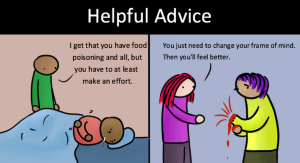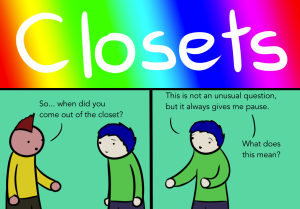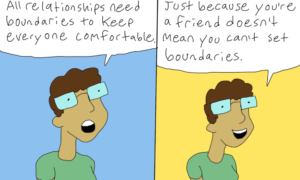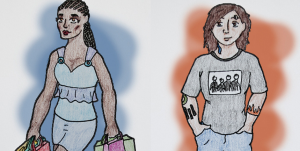Recently, I decided to disclose to a new, cis, straight friend that I’m trans.
This was a strange situation since I’ve always thought of myself as visibly trans, but this friend made cissexist assumptions about my body that suggested otherwise (“You are of the superior gender with your XX chromosomes!”).
Biting my tongue, I contemplated when to tell him that I am a trans woman and came to the decision that I would tell him if he asked me out on a date. Otherwise, a friend doesn’t necessarily need to know unless I feel comfortable and safe disclosing that.
Eventually, we began flirting with each other, and I felt safe enough to disclose my gender, so I did. He was super sweet and kind, and admitted he already knew because our professor had misgendered me in class before.
But then, he asked The Question: “Do you have it?”
I was crushed.
I snapped back with, “Are we having sex? Why would you ask me that?”
He fumbled with his words for a moment, processing and understanding that what he said was incredibly harmful and rude.
We talked for a few hours and worked it out. Once I was home, it was my turn to process what happened, and why my friend’s first concern upon disclosure was my genitalia.
What I found was that I wasn’t surprised by his words. I had heard them so many times before, in many different ways, by so many types of people.
I had become desensitized to these hurtful words because part of me understands, as a trans woman, my body is seen as a spectacle for others to make judgments and assumptions about.
Trans women are exotified by the fascination of our bodies, specifically our genitalia. That part of us makes us “different,” some type of uncharted territory that cis people’s curiosity can’t help but to ask intrusive questions.
In addition to our trans identity, it’s also our race that makes us susceptible to exotifying questions and the cis gaze.
Not only do we get the “Where are you from and what does your name mean?” questions, we also receive “Have you had The Surgery?”
All these questions work to remind us how different we are from cis white people. In addition to being uncomfortable, it’s also isolating us from creating relationships with people we share an affinity with.
The following are four ways that our exotification is played out by many people, from fetishizers to feminists. Hopefully you’ll learn how this is harmful – and how to do better.
1. Pornographic Fetishization
Pornography of trans women is incredibly damaging to people’s expectations of our bodies and sexuality.
Most people assume our bodies will be completely hairless, with various surgeries done to “correct” our masculine features. But oftentimes, this doesn’t match our actual bodies, rendering us undesirable.
The pornographic depiction of trans women of color, in particular, shows the racialization of our bodies.
We are expected to be the racist idea of how white supremacy imagines cis women of color to look – wider hips, bigger breasts, and fatter asses for Black and Latina trans women and thinner, more petite bodies with smaller hands and feet for Asian trans women.
It’s important to note that pornographic images of trans women of color isn’t solely portrayed in the sex industry.
Trans women of color who are portrayed as street sex workers or “accidental” hookups contribute to the sexual exotification of our bodies as well (see: Laverne Cox in Carla, Yasmin Lee in Hangover 2).
By constantly showing us as solely being in relation to sex, we are not humanized as women with careers, goals, interests, or hobbies.
This is why movies like Happy Birthday, Marsha!, a film based on trans rights activist Marsha P. Johnson, are so crucial to change the paradigm of trans women of color to fully humanize us.
Bonus: You can do your part by supporting the post-production of the film, then having a fun party to watch it because it’s so beautiful!
2. Queer Celebrityism
Within queer and trans feminist spaces, there is a tendency to choose one trans woman of color and make her a spokesperson for an entire community.
Janet Mock wrote about this sensationalism in Redefining Realness:
Being exceptional isn’t revolutionary, it’s lonely. It separates you from your community.
Who are you, really, without community? I have been held up consistently as a token, as the “right” kind of trans woman (educated, able-bodied, attractive, articulate, heteronormative).
It promotes the delusion that because I “made it,” that level of success is easily accessible to all young trans women. Let’s be clear: It is not.
This celebrityism happens by creating panels and hiring speakers for keynotes with a pre-determined topic, instead of giving the participants creative freedom over their space and platform.
Oftentimes, trans women of color are hired to talk specifically about their racialized gender experiences, which is a part of exotification because it focuses on specific aspects of someone’s identity and not their personhood.
One way to quit queer celebrityism is to uplift the voices in your own communities and let them take leadership in their own projects.
Having trans women of color organize around their interests gives agency back to women who don’t normally get the resources to do so. Your role could be to support their projects and decisions by backing them with funds, resources, and any support they ask of you.
Help build up the trans women around you. I can guarantee they have huge dreams they’d love to make come true!
3. Tokenizing Hiring Practices
It’s telling what places choose to employ trans women. Either employers flat-out discriminate and refuse to hire trans women, or they hire us to fill a diversity quota.
Hiring one of us is often seen as a business’ badge of honor to show how “inclusive” they are, without actually putting in the work to make the workplace safe and inviting for trans women.
This is a tokenizing and lonely experience to be the only trans woman employed in the workplace.
Oftentimes, non-profit organizations are one of the few safe places for trans women to work. Fortunately, many of them are usually truly invested in social justice and educate themselves on trans issues beforehand.
Outside non-profit orgs, trans women are often sex workers or employed in minimum wage, low-skilled jobs. I rarely hear of #GirlsLikeUs getting employed in government or careers that offer a livable wage and benefits.
I would encourage employers to hire more than one trans woman, and to offer full health care services (including transition-related care) that most companies don’t offer.
When workplaces selectively choose which trans women to hire based on our appearance, they are sending a clear message to us that we must look a certain way to be deemed valuable for work.
We know from experience that the exotification of our bodies means that we must be desirable to be employable. This hyper focus on our appearance causes many women to seek dangerous, quick-fixes like fillers to be able to live their life without the barrier of being visibly trans.
Hopefully employers will look beyond our appearances and hire us based on our merits and work ethics, not upon how attractive we are to them.
Unfortunately, many trans women report quitting or being fired for transitioning at a job they had. That initial, in-between stage of one’s gender is often the hardest to find employment.
This is to say, our work efforts don’t change, but our perceived gender creates discomfort for the employer who then decides to fire us.
This is also a crucial time to step up as an ally and help advocate for your trans women co-workers who are under scrutiny for their gender.
Your support could change the outcome of our lives, and save us the agony of unemployment. Not only is your support helping one woman’s job security, it’s also showing upper management the value of our labor and worth.
It takes everyone to undo the exotifying and discriminatory hiring practices that trans women of color face in their selective fields.
4. Sensationalizing Our Stories
One of the major ways trans women of color are exotified is through the sensationalizing of our stories. Most commonly, narratives centered on our death.
My first exposure to a trans woman of color in the media was the Lifetime movie, A Girl Like Me: The Gwen Araujo Story.
This movie was a biography of Gwen Araujo’s life. She was a teenaged trans Latina who was murdered when boys stripped her clothes off and saw her penis.
I was twelve years old when I watched this murder of a young trans girl – and this story, sadly, has only multiplied in the decade since.
Gun Hill Road was another film with a young trans Black-Latina who had a traumatic relationship with her father. I cry every time I watch this movie because it hits too close to home.
And I’m tired of that.
I’m tired of constantly having media reflect the too painful parts of my story. I’m exhausted by the scenes that focus on us stuffing our bras and hips, painting our lips and fixing our hair.
I would love to watch a movie with a trans woman of color who’s a chef, happily partnered with a lovely dog. Or maybe she’s an intergalactic warrior saving alien planets and beings from huge star explosions.
Simply, I’d love a story that doesn’t focus on the trauma that we’ve experienced.
This means writing and casting trans women of color in roles that don’t focus solely on our gender and transition.
The cool thing is, I know so many trans women of color with fascinating lives and interests who would make great writers and actresses if you gave them the platform to share their creativities.
I’m just saying, I’d love to see Mey Rude write a witchy comic nerd into existence, and I’m sure Cherno Biko has some fantastic ideas for a fun story.
These stories aren’t just for fun though; they are tools to envision what futures and possibilities we can have beyond pain and misery.
The more media created by trans women of color sharing our own reflections of ourselves is imperative to shifting the cultural conceptions of who we are.
Instead of playing archetypal characters of trans women of color, we can create new depictions of ourselves free of exotification.
***
Ending the exotification of trans women of color is a huge task to take on, but I completely believe in our collective efforts in ending this dehumanization.
The first step is to ask us what we want to bring into the world. I assure you great things can happen, like Peacock Rebellion’s all-TWOC comedy show or biyuti publishing, a press run by and for trans women of color.
I hope no young trans girl has her first exposure to herself be a murder movie based on a real person. Instead, I hope she sees Jazz Jennings making mermaid tails to support fellow trans children.
Making our dreams come true is setting a strong foundation for future generations of young trans girls of color to see themselves as complex, fun, happy people.
[do_widget id=’text-101′]
Luna Merbruja is a Contributing Writer for Everyday Feminism. She’s the author of Trauma Queen, an intern at Biyuti Publishing, international sorceress of performance art, and co-coordinator of the 2014 International Trans Women of Color Network Gathering. She’s currently working towards her career as a sex and trauma therapist.
Search our 3000+ articles!
Read our articles about:
Our online racial justice training
Used by hundreds of universities, non-profits, and businesses.
Click to learn more





















